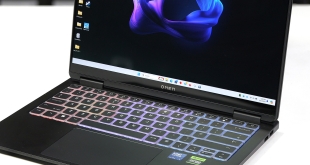At Computex Intel was speaking about the future of Ultrabooks and was making a very big deal out of it, but judging by the current crop of products, the future has yet to arrive. Some of the models that are launching later this year are getting closer to Intel’s vision, but for the really cool stuff it looks like we’ll have to wait a little bit longer.
The next generation of Ultrabooks are set to feature all kind of sensors, of which some of the more useful ones – at least based on Intel’s demos – includes motion sensors which can alert you if someone is moving your Ultrabook for example. But Intel is also working on better support for things like voice control, voice recognition, facial recognition and many other things.
Another interesting demo included wireless charging, but of your smartphone from an Ultrabook. This consisted of a smartphone with an external “jacket” and a modified Ultrabook with a wireless charger built in. Place the smartphone next to the Ultrabook and it’s detected and begins to charge.
Intel is also targeting the corporate market and both Fujitsu and HP were showing of upcoming Ultrabooks for corporate users. The Fujitsu was a fully working system, but we have a feeling it won’t be particularly popular due to its “Ethernet port on a dongle” and lack of D-sub connector. The HP Pro Book was a mock-up, but looked very slick and had more of the type of features we’d expect to see on a corporate Ultrabook.
So what about consumer models? Well, Toshiba was showing off its recently announced Satellite U845W which has a 21:9 aspect ratio display, with NEC demoing its 999g 13.3-inch LaVie Z which should be the lightest 13.3-inch Ultrabook when it launches in Japan later this summer. Samsung went the other way with its 15-inch Series 9 Ultra which despite its size wasn’t nearly as heavy as your average 15-inch notebook.
While we’re on the subject of Samsung, the company was also showing off its upcoming Series 5 Ultra Convertible which is using a similar design to Lenovo’s Yoga concept. That said, the Samsung felt like a retail ready product with very solid hinges and an overall nice finish.
Some more conceptual models such as Foxconn’s F210 were also on display. There are two things that make the F210 stand out from the crowd, its screen and its keyboard. The screen is mounted in a U shaped swivel which allows it to rotate 360 degerees, but it can also be tilted backwards and forwards. As such you can use the notebook with the screen resting standing up on the keyboard – something that’s useful when you’re on an airplane for example and want to watch a movie on it – or it can be placed entirely flat against the keyboard in tablet mode. The keyboard itself is nigh-on flat and despite this there’s a bit of travel in the keys and you can clearly feel them being depressed, but we’re not sure if this is the kind of keyboard we’d want on a work notebook.
We’re not sure the world is ready for Intel’s Ultrabook vision, but it’s interesting to see where the company is trying to take things. Convertible Ultrabooks isn’t a bad idea as such, but it has to be done right. Of the many presentations and demos we saw at the show, some work still needs to be done, but at least part of the problem appears to be Windows 8 which is simply too different for most to figure out how to use it intuitively on a touch screen.
Kitguru says: Time will tell if this is the right move, or if consumers will shun touch-screen enabled PC’s as the plague.
 KitGuru KitGuru.net – Tech News | Hardware News | Hardware Reviews | IOS | Mobile | Gaming | Graphics Cards
KitGuru KitGuru.net – Tech News | Hardware News | Hardware Reviews | IOS | Mobile | Gaming | Graphics Cards




































